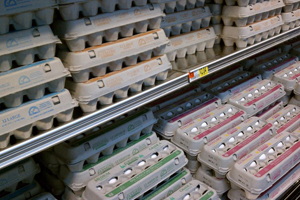EU egg policies discussed during IEC Business Lecture

The opening conference session at the IEC Business Conference Vienna 2014 brought delegates straight down to business.
The delegates heard from the former EU Commissioner of Agriculture, Dr Franz Fischler, as he discussed the latest EU polices concerning agriculture, and the egg and poultry industries in particular. Dr Fischler discussed with IEC delegates the impact EU policy has on supply prices, and the stability of feed grains during the coming decade.
During his presentation he told the IEC: “The good news is we have 40 years of decreasing agriculture commodity prices behind us – now prices are rising”. Dr Fischler went on to explain that he expects to see steady growth in agricultural commodity prices in the EU over the coming decade. He also predicts strong demand for cereals to continue in the EU during the coming years, with much higher increases in yields of maize, sunflower and rapeseed oil.
Although pig meat remains the largest meat in Europe, in regard to market share, Dr Franz Fischler told the IEC to expect enormous growth in the EU’s poultry sector during the next 10 years.
During his Business Lecture to the IEC, Dr Fischler discussed the details of the EU’s Common Agricultural Policy (CAP), explaining that the goal of the EU is to create balance between the economy, ecology and social affairs: to achieve greater competitiveness, improved sustainability, implement new green initiatives, and ensure greater effectiveness for EU agriculture.
Delegates also heard from Johann Morwald, during the conference’s Customer Focus session. Morwald is a former ALDI Board Member, and he provided delegates with invaluable insight into the way discount retailers work, and how to maximise a business’s opportunity of becoming a supplier. He told delegates that within Central Europe, 80% of eggs are sold through grocery retail stores, and that the two leading discount stores account for 60% of this market share, resulting in each company selling 30% of the eggs sold in Central Europe.
Morwald offered advice to delegates about how the stores allocate space to their products and he told the IEC that due to the scarcity of floor space the purchasing director’s main role was to: “identify the absolute best seller of the respective product groups”, stressing that it is in the retailer’s best interest to achieve the highest possible sales for the lowest floor space. Morwald told the IEC delegates: “It is therefore an important commandment of all negotiations to be well prepared, with sophisticated layouts and design concepts, to convince the purchasing director of additional value to sales and profit by eggs.”













